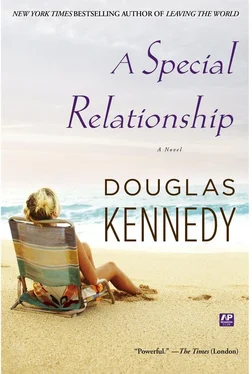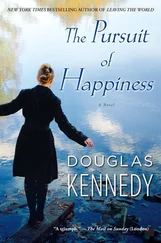'They never do'.
'And people are so abrupt with each other in shops'.
Margaret grinned a big grin.
'Oh, you've noticed that, have you?'
Indeed, I had - particularly in the form of the guy who ran my local newsagent. His name was Mr Noor - and he was always having a bad day. In the weeks that I'd been buying the morning papers at his shop, I'd never known him to ever favour me (or any other customer) with a smile. I had tried many times to force a grin out of him, or to at least engage him in a basic, yet civil conversation. But he had steadfastly refused to budge from his position of ongoing misanthropy. And the journalist in me always wondered what was the root cause of his unpleasantness. A brutal childhood in Lahore? A father who beat him senseless for the slightest infraction? Or maybe it was the sense of dislocation that came with being yanked out of Pakistan and dropped into the chilly dankness of London in the mid-seventies - whereupon he discovered he was a Paki, a Wog, a permanent outsider in a society that despised his presence.
Of course, when I once articulated a version of this scenario to Karim - the guy who ran the corner shop next to Mr Noor's newsagency - I was greeted with serious laughter.
'Bloke's never been to Pakistan in his life', Karim told me. 'And don't think it's something you've done that's made him treat you the way he does. He does it with everybody. And it's nothing to do with nothing. He's a miserable git, that's all'.
Unlike Mr Noor, Karim always seemed to be having a good day. Even on the bleakest of mornings - when it had been raining nonstop for a week, and the temperature was just above freezing, and everyone was wondering if the sun would ever emerge again - Karim somehow managed to maintain a pleasant public face. Maybe this was something to do with the fact that he and his older brother, Faisal, were already successful businessmen, with two other shops in this corner of South London, and plenty of plans afoot for further expansion. And I wondered whether his innate optimism and affability were rooted in the fact that, though a native Brit, he had aspirations - and a curiously American sense of confidence.
But on the morning after my Ibsen night out with Margaret, I didn't need anything from Karim's shop - so my first public contact of the day was with Mr-Bloody-Noor. As usual, he was in sparkling form. Approaching his till with my Chronicle and my Independent in hand, I said, 'And how are you today, Mr Noor?'
He avoided my eyes, and replied, 'One pound ten'.
I didn't hand him the money. Instead I looked directly at him and repeated my question, 'And how are you today, Mr Noor?'
'One pound ten', he said, sounding annoyed.
I kept smiling, determined to get a response out of him.
'Are you keeping well, Mr Noor?'
He just stuck his hand out for the money. I repeated my question again.
'Are you keeping well, Mr Noor?'
He exhaled loudly.
'I am fine'.
I graced him with a very large smile.
'Delighted to hear it'.
I handed over my money, and nodded goodbye. Behind me was a woman in her forties, waiting to pay for the Guardian she held in her hand. As soon as I left the shop, she caught up with me.
'Well done you', she said. 'He's had that coming to him for years'.
She proffered her hand.
'Julia Frank. You live at Number 27, don't you?'
'That's right', I said, and introduced myself.
'Well, I'm just across the road at Number 32. Nice to meet you'.
I would have lingered, trying to engage her in a chat, if I hadn't been late for an interview with a former IRA man turned novelist, so I simply said, 'Drop over sometime'. She replied with a pleasant smile... which may have been her way of indicating yes, or just another example of the maddening reticence of this city. But the very fact that she stopped to introduce herself (and to compliment me on standing up to Mr Charm School) kept me buoyed for most of the day.
'So a neighbour actually spoke with you?' Sandy said when I called her later that day. 'I'm surprised I didn't see a news flash about it on CNN'.
'Yeah, it's pretty momentous stuff. And get this - the sun was even out today'.
'Good God, what next? Don't tell me somebody smiled at you on the street?'
'Actually, somebody did. It was on the towpath by the river. A man walking his dog'.
'What kind of dog?'
'A Golden Retriever'.
'They usually have nice owners'.
'I'll take your word for it. But you would not believe how pleasant that path by the river can be. And it's only three minutes from my door. And I know it's not a big damn deal, but while I was strolling by the Thames, I found myself thinking: maybe I'm going to find my footing here after all'.
That evening, I expressed similar sentiments to Tony after I saw him glancing around the builders' debris amidst which we were living.
'Don't despair', I said, 'it will all get finished eventually'.
'I'm not despairing', he said, sounding forlorn.
'This will be a wonderful house'.
'I'm sure it will be'.
'Come on, Tony. Things will get better'.
'Everything's fine', he said, his voice drained of enthusiasm.
'I wish I could believe you mean that', I said.
'I do mean it'.
With that, he drifted off into another room.
But then, at five that morning, I woke up to discover that everything wasn't fine.
Because my body was suddenly playing strange games with me.
And in those first few bewildering moments when the realization hit that something was very wrong, I bumped into an emotion I hadn't encountered for years.
Fear.
Four
IT WAS AS if I had been attacked during the night by a battalion of bed-bugs. Suddenly, every corner of my skin felt as if it was inflamed by what could only be described as a virulent itch - which no amount of scratching could relieve.
'I don't see any rash', Tony said after he discovered me naked in our bathroom, scraping my skin with my fingernails.
'I'm not making this up', I said angrily, thinking that he was accusing me of falling into some psychosomatic state.
'I'm not saying you are. It's just...'
I turned and stared at myself in the mirror. He was right. The only marks on my skin were those made by my frantic clawing.
Tony ran me a hot bath and helped me into it. The scalding water was momentarily agonizing - but once I adjusted to its extreme heat, it had a balming effect. Tony sat down beside the bath, held my hand, and told me another of his amusing war stories - how he contracted head lice while covering some tribal skirmish in Eritrea, and had to get his head shaved by a local village barber.
'The bloke did it with the dirtiest straight edge razor imaginable. And, wouldn't you know it, he didn't have the steadiest hand - so by the time he was done, not only was I bald, but I looked like I needed stitches. Even then - having had every last hair scraped away - my head still itched like a bastard. Which is when the barber wrapped my head in a boiling hot towel. Cured the itching immediately - and also gave me first degree burns'.
I ran my fingers through his hair, so pleased to have him sitting here with me, holding my hand, getting me through all this. When I finally emerged from the bath an hour later, the itching was gone. Tony couldn't have been sweeter. He dried me with a towel. He dusted me with baby powder. He put me back to bed. And I did fall fast asleep again, waking with a start at noon - as the itching started over again.
At first, I thought I was still in the middle of some hyperactive dream - like one of those falling nightmares where you know you're plunging into a ravine, until you hit the pillow. Even before I snapped into consciousness, I was certain that another pestilent squad of insects had taken up residency beneath my skin. But the itching had doubled in intensity since last night. I felt sheer unadulterated panic. Dashing into the bathroom, I stripped off my pyjama bottom and teeshirt, and checked myself all over for blotchy rashes or any other signs of epidermal inflammation - especially around my bulging belly. Nothing. So I ran another very hot bath and fell into it. Like last night, the scalding water had an immediate salutary effect - scorching my skin into a kind of numbness that deadened the all-pervasive itch.
Читать дальше












